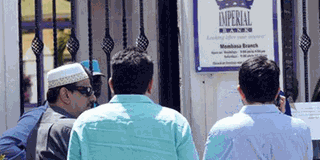How Imperial Bank bosses stole billions from depositors

Imperial Bank customers outside the Mombasa branch read a notice of its closure posted on the gate last year. Courtesy Photo
What you need to know:
- American firm FTI Consulting says Mr Naeem Shah, aside from authorising the transfer of funds between fictitious bank accounts, was also in charge of ensuring that fish firm W.E. Tilley did not appear in the lender’s financial records. Business Daily’s Brian Wasuna shares the details.
Former Imperial Bank managers, Naeem Shah and James Kaburu, were the key players in the multi-billion shilling fraud scheme that enabled long-serving chief executive Abdulmalek Janmohammed to siphon out depositor funds and use fictitious accounts to cover it up, a forensic audit report by American firm FTI Consulting says.
Imperial Bank’s receiver managers say in court papers that FTI’s investigators had found that Mr Shah, aside from authorising the transfer of funds between fictitious bank accounts, was also in charge of ensuring that fish firm W.E. Tilley did not appear in the lender’s financial records.
The audit also revealed that Mr Shah helped W.E. Tilley conceal some Kshs12 billion (Shs401 billion) it irregularly received from the bank through fictitious accounts.
The Kenya Deposit Insurance Corporation (KDIC) adds that Mr Kaburu had been making transfers to and from the W.E. Tilley accounts as far back as November 2006, besides approving payment of Kshs295 million (Shs9.9 billion) to a fictitious account named Hanscombe Management Limited.
Anne Muoki, the assistant receiver manager at Imperial Bank, says auditors have also found evidence that Mr Shah and Mr Kaburu both received millions of shillings from some of the fictitious accounts at Imperial Bank.
“Mr Shah was also responsible for concealing the overdrawn amounts in the Tilley accounts from the bank’s books.
Entries in the Hanscombe account and other fictitious accounts were passed with a view to concealing or suppressing the overdrawn amounts in the Tilley accounts in order to ensure they did not appear in the bank’s ordinary statement of accounts,” the receiver manager says in court papers.
Ms Muoki has also produced in court a summary of the entries passed on the Hanscombe account on the authority of Mr Shah to clear the overdrawn amounts of about Kshs12 billion (Shs401 billion) as evidence of the two managers’ role in the Kshs28.8 billion (Shs962 billion) fraud.
“Produced hereto are copies of extracts of statements that were retrieved from the bank’s system by FTI Consulting, which show that Mr Kaburu authorised Sh295 million to be passed on the Hanscombe account on March 30, 2007,” Ms Muoki says in an affidavit.
KDIC has filed a suit to recover Sh34 billion from Mr Shah, Mr Kaburu and the family of Mr Janmohammed, who it claims were all beneficiaries of the mega fraud scheme.
Mr Shah had claimed in response to the suit that he was only authorised to clear transactions of Kshs1 million (Shs33 million) or below.
But the KDIC has attached documents retrieved by FTI Consulting indicating that shortly after the death of Mr Janmohammed in September last year, Mr Shah authorised payments of Kshs161 million (Shs5.4 billion) to the fictitious Hanscombe account to conceal more irregular amounts paid to one of W.E Tilley’s accounts.
Mr Shah has also claimed that he was asked to act as managing director of Imperial Bank, but he turned down the offer.
KDIC has attached documents showing correspondence between Imperial Bank’s top managers stating that the W.E. Tilley accounts would be handled by the credit department, which was under the leadership of Mr Shah.
Two FTI Consulting sleuths—Andrew Durant and John Hudson—told the KDIC that they were present at the October 7 and 15, 2015 meetings of Imperial Bank’s directors with Mr Shah and Mr Kaburu.
Mr Kaburu at the meeting allegedly admitted to the existence of a report writing tool used to tamper with Imperial Bank’s books.
He allegedly added that the report writing tool was developed by a former Imperial Bank employee. The court filings do not, however, reveal the name of the former employee.
FTI Consulting’s investigations have further revealed that Mr Janmohammed, Mr Shah and Mr Kaburu would attribute payments to the fake accounts yet the money actually went to W.E. Tilley.
Mr Kaburu had in his affidavit claimed that he only came to learn of the scam after being promoted to acting deputy managing director following Mr Janmohammed’s death.
He claimed that the promotion allowed him to take a deeper look into Imperial Bank’s and Tilley’s books after which he raised the alarm to the lender’s shareholders. But the KDIC reckons that in November 2006 Mr Kaburu authorised transactions of Kshs150 million (Shs5 billion) to W.E. Tilley, an indication that he was part of the scheme.
Mr Kaburu had claimed that he approached Mr Janmohammed on separate occasions to question the validity of the transactions on the W.E. Tilley accounts but was turned away and told that they were legitimate.
Ms Muoki further claims that Mr Kaburu in 2012 intentionally struck out W.E. Tilley’s name from Imperial Bank’s list of top 50 borrowers, and lied that the fish firm had only one account with the lender when it actually had three.
The KDIC claims Mr Shah and Mr Janmohammed controlled eight fictitious accounts from which they withdrew Kshs930 million (Shs31 billion) in the form of cash, cheques and telegraphic transfers.
Mr Shah says the suit and the freezing of his bank accounts and assets has damaged his reputation.
But the KDIC says it is ready to deposit whatever amount the court will order as security in the event it loses the case.




